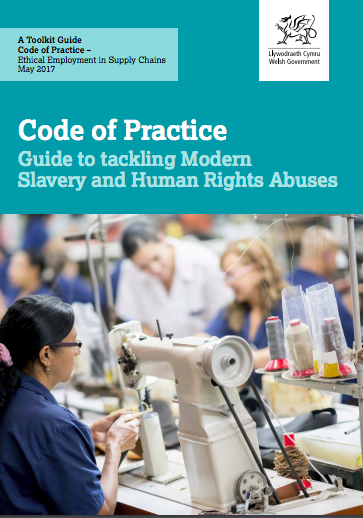The Welsh Government is committed to ensuring workers are treated fairly and with respect and to making Wales hostile to slavery. The Code of Practice – Ethical Employment in Supply Chains is designed to help ensure workers in public sector supply chains in Wales are employed in a fair and ethical way. The Code covers the following employment issues:
• Modern Slavery and human rights abuses;
• Blacklisting;
• False self-employment;
• Unfair use of umbrella schemes and zero
hours contracts; and
• Payment of the Living Wage
The ‘Wales Procurement Policy Statement’ (WPPS) supports this and sets out the expectations placed on every public sector organisation in Wales. The Code of Practice has been developed to reflect the overall aims and ethos of the refreshed WPPS and supports achievement of the following Well-Being of Future Generations Goals, as set out in the Well-Being of Future Generations (Wales) Act 2015:
• A prosperous Wales – An innovative, productive and low carbon society which recognises the limits of the global environment and therefore uses resources efficiently and proportionately (including acting on climate change); and which develops a skilled and well-educated population in an economy which generates wealth and provides employment opportunities, allowing people to take advantage of the wealth generated through securing decent work. The Code of Practice will contribute to the achievement of this Well-Being Goal by providing better employment opportunities and supporting long term career development through the improvement of employment practices across supply chains in Wales.
• A more equal Wales – A society that enables people to fulfil their potential no matter what their background or circumstances (including their socioeconomic background and circumstances). The Code of Practice will contribute to the achievement of this Well-Being Goal through supporting the eradication of unfair employment practices across supply chains in Wales.
• A globally responsible Wales – A nation which, when doing anything to improve the economic, social, environmental and cultural well-being of Wales, takes account of whether doing such a thing may make a positive contribution to global well-being. The Code of Practice will contribute to the achievement of this Well-Being Goal through supporting the eradication of modern slavery across global supply chains.

